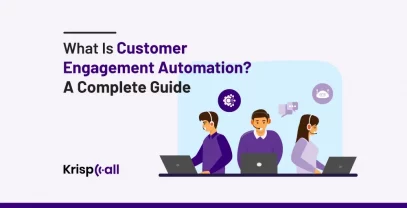Can you imagine reaching out to a company via email and then continuing the conversation over the phone 📞, and later on their social media, without repeating your queries over and over again?
Yes, it can be possible with Omnichannel customer support. Omnichannel integrates all communication channels in a single platform so agents can provide a service to a customer in a unified dashboard. It will eliminate the need for customers to shift from one channel to another.
Providing customer service through omnichannel can be challenging. But don’t worry; we will provide you with detailed information about omnichannel, its benefits, challenges, strategies, and best practices to help your business offer the best service to customers.
🔑 KEY HIGHLIGHTS!
- Omnichannel support is a customer-centric support system that integrates all communication channels and provides customer service in a unified platform.
- With Omnichannel, businesses can deliver better customer experience, increase sales, and increase customer retention.
- To provide better omnichannel customer support, the business first needs to invest in the right tools, train agents, monitor customers’ feedback, and offer self-service.
- Using an omnichannel is challenging for businesses as they have to integrate different channels, which can be technically difficult.
- Investing in training and tools can be costly, and businesses also should care about customer data privacy.
What is omnichannel customer support?
Omnichannel customer support is a business tool that integrates all your channels, such as email, live chat, social media, and online communities, into a unified platform and provides a seamless customer experience. Omnichannel gives businesses a detailed view of customer interaction and enables them to answer various queries more efficiently.

Omnichannel allows businesses to contact customers across multiple channels so customers don’t have to go through each page to find the perfect solution. When businesses integrate all their channels into a single platform, they can track and store customers’ interactions in a single platform. Later, they can use this stored data to provide excellent customer service.
For example, an omnichannel approach to customer service includes things like providing unified customer support through channels like live chat or SMS, social media, and phones.
In addition to providing customers with multiple touchpoints for contacting agents, valuable elements such as FAQs and automated chatbot support resources can also play an important role in omnichannel customer service strategy.
Omnichannel support has become increasingly popular as many businesses want to provide good-quality customer service. Many businesses, such as those in the Banking, Education, Retail, Food and drink, and Gyms sectors, use omnichannel customer service.
One example of a business that uses omnichannel are Bank of America and First Republic Bank. These banks provide self-service mobile apps with tools like appointment, 📱texting, live chat, chatbots, email, and check-to-deposit.
Why is omnichannel support essential for customers?
Omnichannel support is essential for customers as it allows them to shop smoothly from one channel to another with the same device.
This means that whether the customers are making purchases from their home computer, using their phone, or physically visiting the store, they can have one unified platform where they can shop.
For example, consumers can begin shopping online, search for a nearby store that carries the products they are looking for, and then pick the items up in person.
Also Read: Why Do Businesses Need to Invest in Omnichannel Customer Support
Omnichannel support Vs. multichannel support
People often think of omnichannel and multichannel support as the same thing. However, multichannel and omnichannel support involve different approaches and strategies for providing customer service.

Omnichannel customer support focuses on providing service to the customer on a single platform. It allows customers to switch channels and seamlessly communicate without getting confused. In other words, they do not have to explain their request every time they switch channels.
On the other hand, Multichannel support is a method in which a business offers customer support through multiple channels, such as text messages, emails, and social media platforms. Businesses had to focus on providing service on various channels rather than focusing on one channel.
Let’s say a client asks about a recent product that the business sells through social media. Customers didn’t understand the benefit that the product provided them and called several businesses. When agents pick up the phone, they will not know the detailed background of the issue, and the customer will have to explain it from the beginning. As multichannel support provides support to different channels independently, they wouldn’t know the background of the same customer.
Benefits of omnichannel customer support
Omnichannel customer support offers multiple features that help to improve the overall business objective and satisfy customers within a single platform.
Here are some benefits of omnichannel customer support:
- Improves customer satisfaction: When a business provides a service or any kind of solution to customers in real-time on a single platform, the customer will feel valued and heard. Although most customers complain that businesses do not provide service on time, businesses that provide solutions quickly using omnichannel will have satisfied customers.
- Higher customer retention: According to Loyalty 360, those companies who offer omnichannel communication strategies have an annual retention of 91% compared to those who don’t provide. The increase in customer retention shows that business is performing well in the market.
- Better customer service: Omnichannel provides customers with a personalized experience across the channel, eliminates the need to repeat, and offers a consistent solution. With all these wide features, any business can enhance its customer service.
- Boost customer experience: Omnichannel allows businesses to send customized and personalized customer messages and services. When businesses send them personalized interaction, customers might feel special and more connected with the brand. Eventually improving the business’s image and boost customer experience.
How do you implement an omnichannel customer support strategy?
To successfully implement an omnichannel customer service strategy, businesses should follow these key steps:
1. Define clear customer service channels
Businesses should remember that before implementing omnichannel customer support, they should always create a clear idea of who their audience is and how they interact with their current channel to discover these types of ideas, ask questions like:
- Do you have the right systems in place?
- What channels do customers use to contact support?
- Which channels fit your product well and allow you to deliver excellent customer support?
- After determining how customers contact you, you can manage all your channels to provide the best customer support.
2. Invest in the right tools and platform
A customer service tool must provide an agent with a great platform to handle all customer requests. Only with the right tools and platform business can successfully implement an omnichannel strategy.
So, investing in the right tool and platform is essential for any business. But before investing in a tool, here are a few points to keep in mind:
- It’s scalability
- Pricing
- Security
- Flexibility
- Functionality
- Integration feature
Identify and analyze if that tool has all these features and select the best one for your business.
3. Train customer service agents
Integrating all those channels and using them in a single platform requires extensive training and skills. Companies must train their customer support representatives with the proper skills so that they can provide effortless service to customers.
Businesses can provide training to your support representatives in the following ways:
- Visual and in-person conferences
- Formal mentoring
- Documentation
- Job shadowing
- Peer relationships
Providing better training for agents will familiarize them with the new system, and they will also have internal knowledge about how all these omnichannel routing tools help businesses boost customer satisfaction.
4. Regularly monitor customer feedback
Businesses should regularly monitor customer feedback to track analytics across omnichannel support and ensure they are giving customers the best service. Analytics tools can collect all the data on customer interactions and their thoughts on your product.
One way to track customer feedback is to conduct surveys. Here are a few more metrics to track:
- Customer lifetime value
- Speed of resolution
- Ticket volume
- New customer registration
- Most used channels
Monitoring and analyzing customer feedback will help your brand improve its service and provide the best customer service.
5. Provide self-service options
Businesses can always provide self-service options for businesses. Self-service is a method in which customers resolve an issue with a company on their own. Self-service options allow customers to find answers to their questions quickly and easily. Here are some self-service options you can include in your omnichannel support:
- FAQ pages
- Chatbots
- Knowledge base
- Support forum
- Automated call center
- Mobile helps apps
These customer self-service options help customers save time as they get quick responses and agents can also focus on more complex issues.
Challenges of omnichannel customer service
Even though omnichannel customer service offers a wide range of benefits for both business and customer, it does have some difficulties.
Here are five challenges of omnichannel customer service;
Integration Challenges
As we all know, Omnichannel can only be effective when integrated with different channels and their functionality. However, integrating different tools can be complicated as each channel has its own features. Integrating all channels in a single platform can sometimes restrict important information and disrupt the smooth operation of your support team.
Staying Within a Budget
As we know, Omnichannel requires a lot of integration with various applications and software, which can be a large investment. Businesses will have to use various new technologies just and advanced omnichannel software in their program, which can be a little bit costly and complex for small businesses.
Training Agents
Agents require extensive training to understand and use the tools and channels when using omnichannel software. Training agents requires a lot of money and time. Moreover, businesses will have to create training manuals and update them from time to time.
Keeping Up With technology
The technology world is evolving, and it is important for businesses to keep up with this technology to provide the best omnichannel experience. However, it can be challenging for businesses as new technologies are often complex and expensive.
Data challenges
Data privacy is also a major concern for businesses and customers, but to provide perfect customer support, businesses must use customer data. To make customers feel secure about their information, what businesses can do is they can necessary security measures to protect customers.
Omnichannel support best practices
- Divide customers: Dividing customers into different categories based on their preferences, behavior, likes, and dislikes can help businesses provide a more personalized experience to the customer. Dividing allows businesses to tailor their support based on different group needs, which eventually leads to better satisfaction and customer retention.
- Enable self-service options: Businesses should always make sure to provide customer with the proper information they need before they have to ask for it. With the help of chatbots, automated messages, interactive voice response (IVRs), business can actively provide clients with self-service options.
- Set up mobile-based service: In today’s market, offering a service through mobile is one popular method of providing service. Many customers also prefer to make purchases and talk to businesses through mobile. So, businesses should consider investing in different mobile applications or mobile-friendly software to connect with customers properly.
- Define priorities: When support requests are categorized, different priorities can be assigned to each type, making it easier to know which tickets to handle first. Various omnichannel software offers an automated system that assigns tasks based on priorities.
Omnichannel customer support software
Omnichannel customer service software integrates various communication channels, such as email, social media, live chat, and phone, into a unified interface and allows businesses to interact with customers across various touchpoints.
A unified platform will help you centralize communications control and streamline access to customer data history. Moreover, it ensures that everyone has the correct information so that they can perform their tasks efficiently.
Omnichannel helps you improve your workflow by allowing you to integrate communication sources in three different ways:
- Native integrations: Some channels, such as email support and Microsoft Teams, can be created and installed right from the instance.
- Third-party integrations: Other app connectors that can be linked using Zapier include, but are not limited to, Slack, Google Calendar, and Pager Duty.
- Free API: If the above is not sufficient, you can integrate with any free API tool out there yourself.
Once omnichannel software is integrated with your business, you can easily manage your tickets on a unified platform.
Conclusion
Omnichannel support integrates with all the digital communication channels and offers
customers a smooth experience. It not only improves customer satisfaction but also boosts customer experience and service.
While implementing omnichannel challenges such as technical, internal, and cost, can be overwhelming for businesses. However, with the proper customer support strategies, businesses can properly implement omnichannel support to provide best service to their customers.





